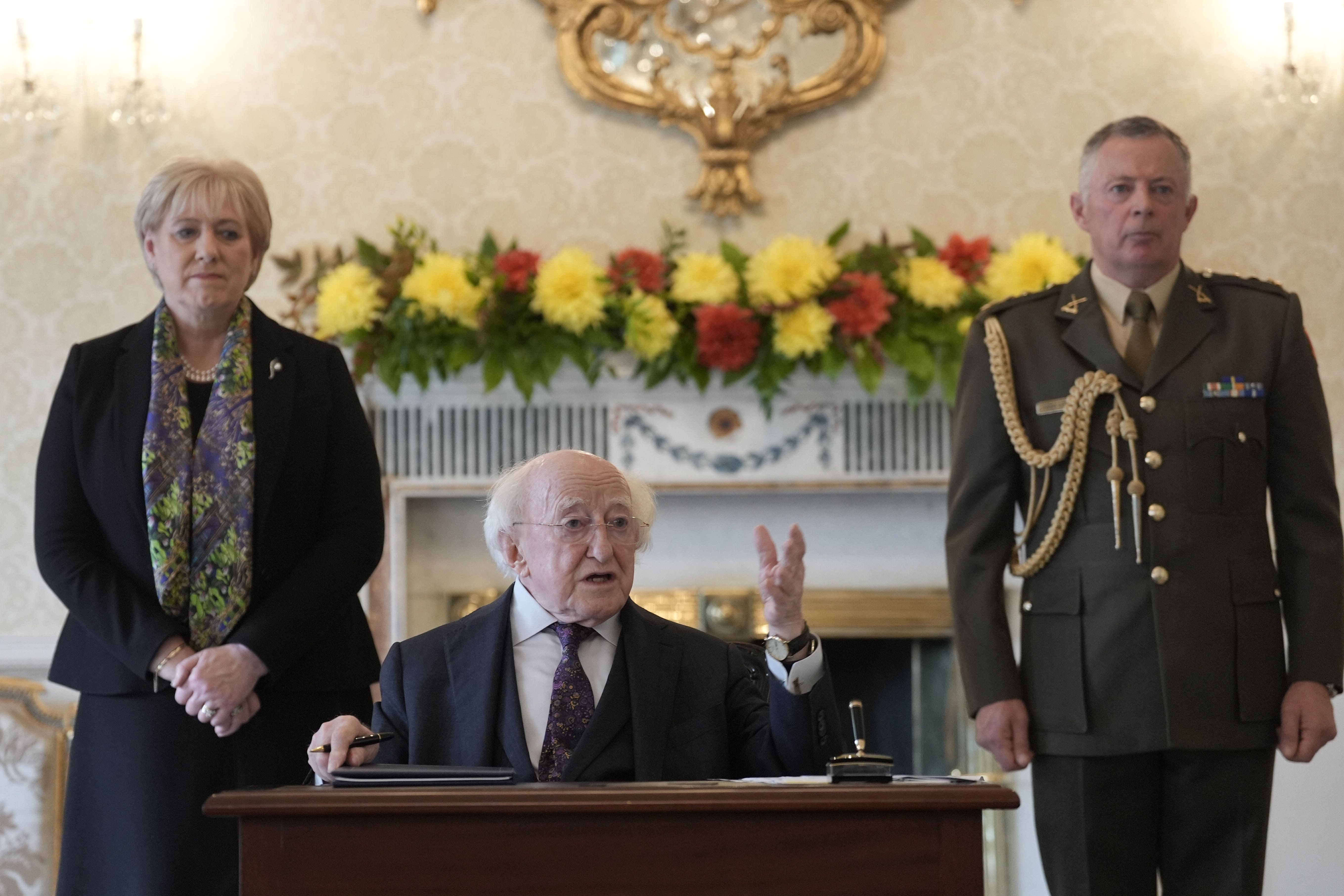Irish president pardons two men of murder 140 years on from their executions
Sylvester Poff and James Barrett were hanged in Tralee Gaol in Co Kerry in 1883.

Your support helps us to tell the story
From reproductive rights to climate change to Big Tech, The Independent is on the ground when the story is developing. Whether it's investigating the financials of Elon Musk's pro-Trump PAC or producing our latest documentary, 'The A Word', which shines a light on the American women fighting for reproductive rights, we know how important it is to parse out the facts from the messaging.
At such a critical moment in US history, we need reporters on the ground. Your donation allows us to keep sending journalists to speak to both sides of the story.
The Independent is trusted by Americans across the entire political spectrum. And unlike many other quality news outlets, we choose not to lock Americans out of our reporting and analysis with paywalls. We believe quality journalism should be available to everyone, paid for by those who can afford it.
Your support makes all the difference.Two men have received posthumous pardons from the President of Ireland more than 140 years after they were wrongfully convicted and hanged for murder.
President Michael D Higgins said the pardons would “lift the shadow” from those who still carry the pain of Sylvester Poff and James Barrett’s executions in Co Kerry.
The men, who were cousins, were convicted of the October 1882 murder of Thomas Browne in the county and were both hanged in Tralee Gaol in January 1883.
However, a recent expert report said that they should be pardoned given that their convictions were unsafe.
Earlier this year, Justice Minister Helen McEntee secured Government approval to recommend the men for the granting of pardons by President Higgins.
Mr Poff was 38 and Mr Barrett was 24 when they died.
Mr Higgins signed the pardons at a ceremony at his resident Aras An Uachtarain in Dublin on Wednesday.
“While we cannot undo what happened, we do have the power to acknowledge that what happened to Sylvester Poff and James Barrett was a great wrong,” he said.
“I am pleased to be able to formally grant a Presidential Pardon to each of the men today, and to at least set the record straight.
“I hope that by doing so will bring a sense of closure to their families following almost 142 years.”
He added: “While we cannot undo the hanging of these two men who were innocent we can in fact actually lift the shadow off those who are interested and those in fact who carry the pain of the false condemnation.”
Descendants of the men attended the ceremony, as did Ireland’s Minister for Social Protection Heather Humphreys.
Representatives of the Castleisland District Heritage Group were also present.The Kerry-based group based have been at the forefront of raising awareness of the case and worked with the Department of Justice on the pardon process.
Mr Poff’s great grandson Tomo Burke welcomed the pardons.
“We thought we would be dead and buried before this thing would ever come but today has arrived and we’re over the moon,” he said.
Agitation for land reform was commonplace in 1880s Ireland, and this often took the form of agrarian violence.
In one of the most notorious incidents, Chief Secretary for Ireland Lord Frederick Cavendish and his under secretary Thomas Henry Burke were murdered in the Phoenix Park in Dublin in May 1882.
Their murders were the catalyst for a legislative response to growing agrarian unrest.
Coercive laws were passed in July 1882 in the aftermath to clamp down on crimes such as “treason, murder, arson, attacks on dwelling-houses and crimes of aggravated violence”.
Co Kerry, and the area around Castleisland in particular, was experiencing a great deal of unrest and violence during this period.
On October 3 1882, Mr Browne was murdered while working in one of his fields in Dromulton, near Scartaglin in Co Kerry.
Two men in dark coats, seen from behind, shot him several times.
Mr Poff and Mr Barrett, who did not match the descriptions of the assailants, were known to be in the vicinity at the time.
The two men were arrested following a statement by a neighbour that they had seen them enter the field where Mr Browne was shot.
The prosecution case largely rested on the evidence of the neighbour, whose story changed as the case progressed and who could not be regarded as a reliable witness.
The men were tried twice before special juries in Cork for the murder of Mr Browne after the jury in the first trial failed to reach agreement on a verdict.
The two men were ultimately convicted in December 1882 and, despite petitions for mercy to the Lord Lieutenant, they were hanged in Tralee Gaol in January 1883.
Dr Niamh Howlin, an expert in 19th century trial law and an associate professor in the Sutherland School of Law, University College Dublin, was asked by the Department of Justice to undertake an independent external review of this case.
Dr Howlin’s examination concluded that a number of factors, including in the investigation and procedures around the trial, led her to form the opinion that the convictions were unsafe.
These factors included a “packed jury”, deficiencies in evidence including conflicting witness evidence, no motive and that other lines of inquiry appear to have been neglected during the investigation and trial.
In addition, the report found that there was no direct evidence against Mr Poff and Mr Barrett, with the case resting on the circumstantial and contradictory evidence of one witness.